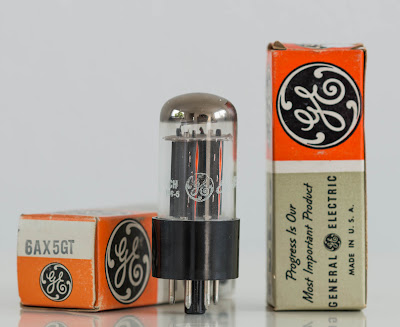The tube of last month was a directly heated rectifier suitable for power amps. This month I am presenting another rectifier, but an indirectly heated and rather small one, usable for small amps or preamps. The 6AX5.
The 6AX5 is a glass tube on an octal base, hence it is also named 6AX5GT. It has a common cathode and two plates in one bottle which makes it usable as a full wave rectifier with a power transformer with center tapped secondary. Of course it could also be used in a bridge configuration together with two individual diodes, either silicon or tube, for example 6AX4.
 The pinout is pictured on the left. Based on it's electrical parameters it would be usable in power supplies designed for the 6BY5 unless the cathodes need to be separate. An advantage of the 6AX5 over the 6BY5 is the lower heater current of 1.2A versus 1.6A. As such it would be perfect as an alternative in the power supply of my recently shown version of the Octal Preamplifier. With it's octal base it would fit right into the theme of that preamp. See the datasheet for all technical details about this tube. This is a great little rectifier which seems to be rarely used nowadays. Availability is good and prices are low.
The pinout is pictured on the left. Based on it's electrical parameters it would be usable in power supplies designed for the 6BY5 unless the cathodes need to be separate. An advantage of the 6AX5 over the 6BY5 is the lower heater current of 1.2A versus 1.6A. As such it would be perfect as an alternative in the power supply of my recently shown version of the Octal Preamplifier. With it's octal base it would fit right into the theme of that preamp. See the datasheet for all technical details about this tube. This is a great little rectifier which seems to be rarely used nowadays. Availability is good and prices are low.The 6AX5GT can be found from all the major tube manufacturers. Here for example from Tung-Sol:
Two versions from Sylvania. One in military packaging and the other in the commercial Sylvania box:
RCA:
General Electric:
I have seen two construction styles of the 6AX5. One has two cathodes (internally connected) :
And the other a single (larger) cathode in the center between the two plates:
Let's have a closer look at both these versions. First the one with two cathodes. Removing the glass:
Cutting off the top mica disk allows a look into the plates:
A close up showing the heater wire in the cathode sleeve:
Removing one of the plates:
A close up of the cathode:
Glass removed from the other type:
Bending away one of the plates reveals the cathode:
A great rectifier which deserves to be used in audio applications.
Best regards
Thomas





















Hello Thomas,
ReplyDeletethanks for this great pictures!
Some of the plates seem to have a red shining surface? Is this an artefact of taking the picture or do you have an explaination for this?
Best regards,
Bernd
Hi Bernd,
ReplyDeletethe plates are made of copper. Only the outer side is coated for better heat dissipation. The other sides have the bare copper surface. At the edges where the plates are connected together, the copper shines through.
Best regards
Thomas
I have found these to be very reliable rectifiers. I rarely find a bad or weak 6AX5. It is a very common type used in octal-base tube radio receivers and older test equipment such as oscilloscopes.
ReplyDeleteRegards
Rob